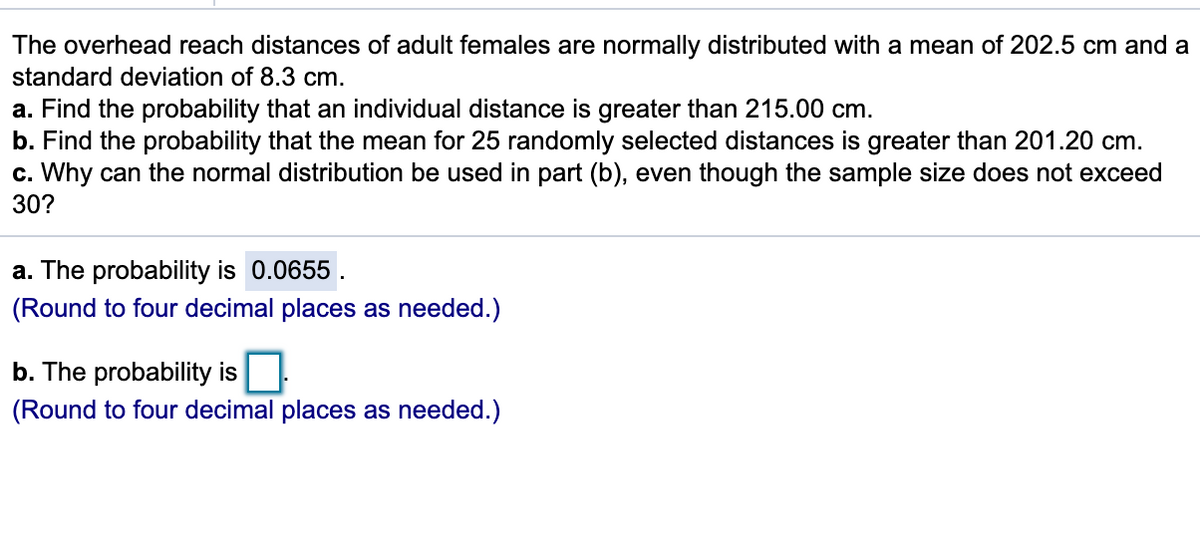The overhead reach distances of adult females are normally distributed with a mean of 202.5 cm and a standard deviation of 8.3 cm. a. Find the probability that an individual distance is greater than 215.00 cm. b. Find the probability that the mean for 25 randomly selected distances is greater than 201.20 cm. c. Why can the normal distribution be used in part (b), even though the sample size does not exceed 30?
The overhead reach distances of adult females are normally distributed with a mean of 202.5 cm and a standard deviation of 8.3 cm. a. Find the probability that an individual distance is greater than 215.00 cm. b. Find the probability that the mean for 25 randomly selected distances is greater than 201.20 cm. c. Why can the normal distribution be used in part (b), even though the sample size does not exceed 30?
Glencoe Algebra 1, Student Edition, 9780079039897, 0079039898, 2018
18th Edition
ISBN:9780079039897
Author:Carter
Publisher:Carter
Chapter10: Statistics
Section10.4: Distributions Of Data
Problem 19PFA
Related questions
Question
100%
The overhead reach distances of adult females are normally distributed with a mean of
202.5 cm
and a standard deviation of
8.3 cm.
a. Find the probability that an individual distance is greater than
215.00
cm.b. Find the probability that the mean for
25
randomly selected distances is greater than 201.20 cm.c. Why can the normal distribution be used in part (b), even though the sample size does not exceed 30?

Transcribed Image Text:The overhead reach distances of adult females are normally distributed with a mean of 202.5 cm and a
standard deviation of 8.3 cm.
a. Find the probability that an individual distance is greater than 215.00 cm.
b. Find the probability that the mean for 25 randomly selected distances is greater than 201.20 cm.
c. Why can the normal distribution be used in part (b), even though the sample size does not exceed
30?
a. The probability is 0.0655.
(Round to four decimal places as needed.)
b. The probability is
(Round to four decimal places as needed.)
Expert Solution
This question has been solved!
Explore an expertly crafted, step-by-step solution for a thorough understanding of key concepts.
This is a popular solution!
Trending now
This is a popular solution!
Step by step
Solved in 4 steps with 4 images

Knowledge Booster
Learn more about
Need a deep-dive on the concept behind this application? Look no further. Learn more about this topic, statistics and related others by exploring similar questions and additional content below.Recommended textbooks for you

Glencoe Algebra 1, Student Edition, 9780079039897…
Algebra
ISBN:
9780079039897
Author:
Carter
Publisher:
McGraw Hill

Glencoe Algebra 1, Student Edition, 9780079039897…
Algebra
ISBN:
9780079039897
Author:
Carter
Publisher:
McGraw Hill